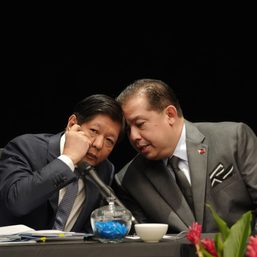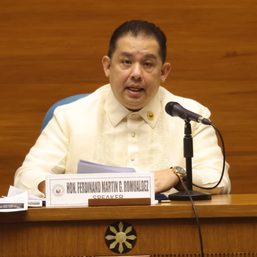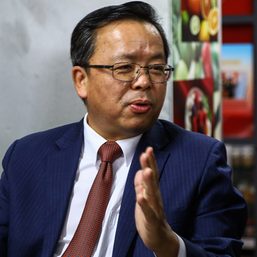SUMMARY
This is AI generated summarization, which may have errors. For context, always refer to the full article.
![[Newspoint] When freedom merges with power](https://www.rappler.com/tachyon/2023/06/TL-when-freedom-merges-power-June-3-2023.jpg)
The merger between ABS-CBN and a subsidiary of a company owned by Speaker Martin Romualdez, first cousin to President Ferdinand Marcos Jr., has provoked reactions ranging from raised eyebrows to open swearing. But the disapproval fails to show the broader and more serious significance of the merger, although, it would seem justifiable as it is, even in its rather limited context.
The merger appears largely viewed from the perspective of an unassuageable grudge the old aristocratic Lopez family, who owns ABS-CBN, is presumed to have harbored against the owners of Prime Media, a grudge going back to the martial law years (1972-1986), the darkest years in the nation’s history, thus inspiring wide sympathy.
The dictator Ferdinand Sr. put the eldest Lopez scion in prison, causing his father, the patriarch, a fatal heartbreak. He also closed the family’s newspaper, The Manila Chronicle, and had his cronies divide among themselves other Lopez companies, including ABS-CBN. His own brother-in-law Benjamin Romualdez, Martin’s father, appropriated the power utility Meralco and also transplanted the Chronicle’s state-of-the-art printing press in his own publishing house.
In 2016, a mere generation after the dictator was booted out, an idolater, Rodrigo Duterte, acceded to the presidency and proceeded to drag the nation down the path to authoritarianism and go after his critics. Just rehabilitated to its pre-Martial Law preeminence in the broadcast business, ABS-CBN was this time denied a normally pro forma renewal of its franchise and forced into deep cutbacks. Now, with Duterte no longer President and the alliance between his political heirs and the succeeding regime looking cracked, if not altogether broken, ABS-CBN makes a deal with a cousin of the sitting President’s who also happens to be his presiding henchman in Congress.
Is there any doubt that this is a Shakespearean deal – A franchise! A franchise! My kingdom for a franchise! – and that it constitutes a surrender of the very freedom intended as a counterweight to official power?
In the face of present-day realities and practicalities, that classical idea may be seen as passé and self-righteous and, applied to ABS-CBN and given the rounds of persecution it has suffered, as unfair. But where exactly does one draw the ethical line in the relationships a press organization carries on, for instance, in in the most basic one – its relationship to its own owners? The very nature of these relationships would seem to me to preclude any consensual judgments, only self-serving ones, of what is right and what is wrong about them.
Indeed, the press is nicely placed in the scheme of things: press freedom is ranked first among all constitutional freedoms. But what practical chances does the press really have against official power, with its own army and police, not to mention its internal revenue? What chances did it have against Ferdinand Sr. and Duterte?
For all the trumpeting we hear about it, press freedom is not guaranteed, not even in the most democratic of settings. What’s guaranteed is a mere plurality of voices, and the great hope is that the cacophony, in its own process of competition and distillation, would produce truthful news and well-reasoned commentaries and that these would be recognized for what they are by the audiences, for their own sakes, for their own well-being.
I’ve stayed in the business long enough to have observed things actually working that way and to a useful extent – that was before and for some time after Martial Law. That’s no longer the case. Social media, which admit anyone as a practitioner and anything, truth or falsehood, as an exchangeable commodity, are drowning out the press. Thus chaos has supplanted the manageable cacophony. And in a society where the operating culture is one of patronage, the patrons, who make up the powers-that-be class, find themselves favored by the phenomenon and actually routinely deploy their own social-media troops.
That the pragmatic inheritors of ABS-CBN don’t mind being partners with a descendant from the persecutors of their family is their business. But mixing the news business and politics is another matter – news is the people’s business.
So it is, apologists for the deal say; then let the people – the audiences – discern and decide for themselves whether to continue to trust ABS-CBN.
Well, exactly the same thing is said in defense of the impostors of social media. – Rappler.com
Add a comment
How does this make you feel?





![[In This Economy] Marcos’ POGO ban is popular, but will it work?](https://www.rappler.com/tachyon/2024/07/thought-leaders-marcos-pogo-ban.jpg?resize=257%2C257&crop=255px%2C0px%2C720px%2C720px)
![[Rappler Investigates] POGOs no-go as Typhoon Carina exits](https://www.rappler.com/tachyon/2024/07/newsletter-graphics-carina-pogo.jpg?resize=257%2C257&crop=424px%2C0px%2C1080px%2C1080px)













There are no comments yet. Add your comment to start the conversation.